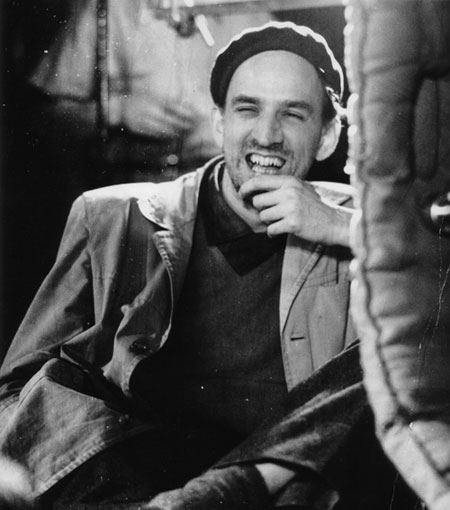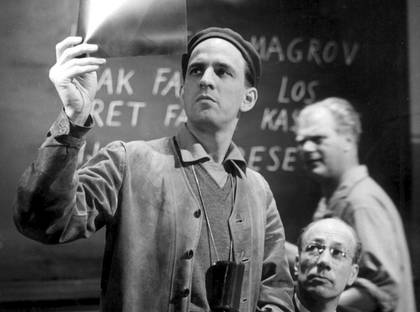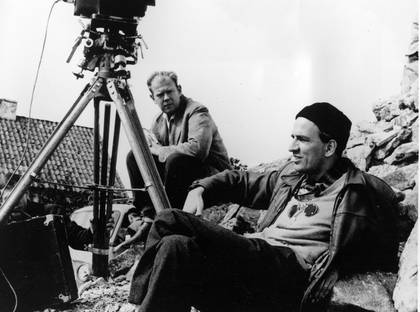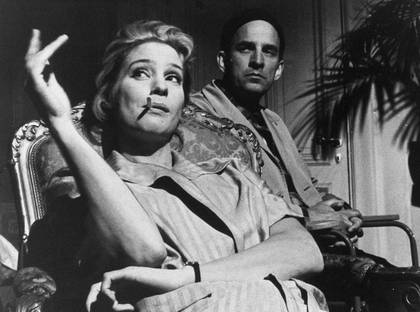<Back to Index>
- Physician Johannes Peter Müller, 1801
- Director Ernst Ingmar Bergman, 1918
- 2nd Chief Minister of the French Monarch Cardinal Jules Mazarin, 1602

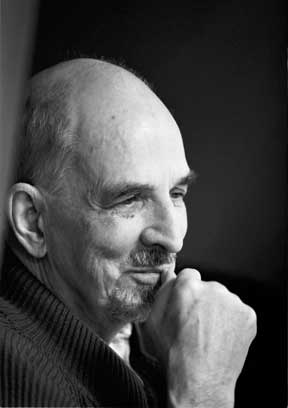
Ernst Ingmar Bergman (14 July 1918 – 30 July 2007) was a Swedish director, writer and producer for film, stage and television. His influential body of work often dealt with themes such as bleakness and despair, as well as comedy and hope, in his cinematic exploration of the human condition. Described by Woody Allen as "probably the greatest film artist, all things considered, since the invention of the motion picture camera", he is recognized as one of the most accomplished and influential dramatic artists of all time.
He
directed over sixty films and documentaries for cinema release and for
television, most of which he also wrote, and directed over one hundred
and seventy plays. Among his company of actors were Liv Ullmann, Bibi Andersson and Max von Sydow. Most of his films were set in the landscape of Sweden, his major themes being death, illness, betrayal and insanity. Bergman
was active for more than six decades, but his career was seriously
threatened in 1976 when he suspended a number of pending productions,
closed his studios, and went into self-imposed exile in Germany for
eight years following a botched criminal investigation for alleged
income tax evasion. Ingmar Bergman was born in Uppsala, Sweden to Karin (maiden name Åkerblom) Bergman, a nurse, and Erik Bergman, a Lutheran minister and later chaplain to the King of Sweden.
Ingmar grew up surrounded by religious imagery and discussion. His
father was a conservative parish minister with certain extreme right
political sympathy and
strict parenting concepts. Ingmar was locked up in dark closets for
"infractions" like wetting the bed. "While father preached away in the
pulpit and the congregation prayed, sang, or listened," Ingmar wrote in
his autobiography Laterna Magica, Though
he was raised in a devout Lutheran household, Bergman later stated that
he lost his faith at age eight years, and only came to terms with this
fact while making Winter Light. Bergman's interest in theatre and film began early: In 1934, at the age of 16, Bergman was sent to spend the summer vacation with family friends in Germany. He attended a Nazi rally in Weimar at which he saw Adolf Hitler. He later wrote in Laterna Magica (The Magic Lantern)
about the visit to Germany, how the German family had put a portrait of
Adolf Hitler on the wall by his bed, and that "for many years, I was on
Hitler's side, delighted by his success and saddened by his defeats". Bergman did two five-month stretches of mandatory military service. In 1937, he entered Stockholm University College (later renamed Stockholm University), to study art and literature. He spent most of his time involved in student theatre and became a "genuine movie addict". At
the same time, a romantic involvement led to a break with his father
that lasted for years. Although he did not graduate, he wrote a number
of plays, as well as an opera, and became an assistant director at a
theater. In 1942, he was given the chance to direct one of his own
scripts, Caspar's Death. The play was seen by members of Svensk Filmindustri who then offered Bergman a position working on scripts. In 1943, he married Else Fisher. Bergman's
film career began in 1941 with his rewriting of scripts, but his first
major accomplishment was in 1944 when he wrote the screenplay for Torment/Frenzy (Hets), a film directed by Alf Sjöberg.
Along with writing the screenplay, he was also given a position as
assistant director to the film. In his second autobiographical work Images: My Life in Film, Bergman describes the filming of the exteriors as his actual film directorial debut. The
international success of this film led to Bergman's first opportunity
to direct a year later. During the next ten years, he wrote and
directed more than a dozen films including The Devil's Wanton/Prison (Fängelse) in 1949 and The Naked Night/Sawdust and Tinsel (Gycklarnas afton) and Summer with Monika (Sommaren med Monika), both from 1953. Bergman first achieved worldwide success with Smiles of a Summer Night (Sommarnattens leende) (1955), which won for "Best poetic humor" and was nominated for the Palme d'Or at Cannes the following year. This was followed by The Seventh Seal (Det sjunde inseglet) and Wild Strawberries (Smultronstället), released in Sweden ten months apart in 1957. The Seventh Seal won a special jury prize and was nominated for the Palme d'Or at Cannes and Wild Strawberries won numerous awards for Bergman and its star, Victor Sjöström. Bergman
continued to be productive for the next two decades. From the early
1960s, Bergman lived much of his life on the island of Fårö, Gotland,
Sweden, where he made several of his films. In the early 1960s he
directed a trilogy that explored the theme of faith and doubt in God, Through a Glass Darkly (Såsom i en Spegel - 1961), Winter Light (Nattvardsgästerna - 1962), and The Silence (Tystnaden - 1963). In 1966, he directed Persona,
a film that he himself considered one of his most important works.
While the shockingly experimental film won few awards many consider it
his masterpiece. Other notable films of the period include The Virgin Spring (Jungfrukällan - 1960), Hour of the Wolf (Vargtimmen - 1968), Shame (Skammen - 1968) and A Passion/The Passion of Anna (En Passion - 1969). Bergman also produced extensively for Swedish television at this time. Two works of note were Scenes from a Marriage (Scener ur ett äktenskap - 1973) and The Magic Flute (Trollflöjten - 1975). After
his arrest in 1976 for tax evasion, Bergman swore he would never again
make films in Sweden. He shut his film studio on the island of
Fårö down and went into exile. He briefly considered the
possibility of working in America and his next film,The Serpent's Egg (1977) was a German-U.S. production and his second English-language film (the first being 1971's "The Touch"). This was followed a year later with a British-Norwegian coproduction of Autumn Sonata (Höstsonaten - 1978). The film starred Ingrid Bergman and was the one notable film of this period. The one other film he directed was From the Life of the Marionettes (Aus dem Leben der Marionetten - 1980) a British-German coproduction. In 1982, he temporarily returned to his homeland to direct Fanny and Alexander (Fanny och Alexander),
a film that, unlike his previous productions, was aimed at a broader
audience, but was also criticized within the profession for being
shallow and commercial. Bergman
stated that the film would be his last, and that afterwards he would
focus on directing theatre. Since then, he wrote several film scripts
and directed a number of television specials. As with previous work for
TV some of these productions were later released in theatres. The last
such work was Saraband (2003), a sequel to Scenes from a Marriage and directed by Bergman when he was eighty-four years old.
Bergman developed a personal "repertory company" of Swedish actors whom he repeatedly cast in his films, including Max von Sydow, Bibi Andersson, Harriet Andersson, Erland Josephson, Ingrid Thulin, and Gunnar Björnstrand, each of whom appeared in at least five Bergman features. Norwegian actress Liv Ullmann, who appeared in nine of Bergman's films and one televisual movie (Saraband), was the last to join this group (in the 1966 film Persona), and ultimately became most closely associated with Bergman, both artistically and personally. They had a daughter together, Linn Ullmann (b. 1966). Bergman began working with Sven Nykvist, his cinematographer,
in 1953. The two of them developed and maintained a working
relationship of sufficient rapport to allow Bergman not to worry about
the composition of a shot until the day before it was filmed. On the
morning of the shoot, he would briefly speak to Nykvist about the mood
and composition he hoped for, and then leave Nykvist to work lacking
interruption or comment until postproduction discussion of the next
day's work. By
Bergman's own account, he never had a problem with funding. He cited
two reasons for this: one, that he did not live in the United States,
which he viewed as obsessed with box-office earnings; and two, that his
films tended to be low-budget affairs. (Cries and Whispers, for instance, was finished for about $450,000, while Scenes from a Marriage — a six-episode television feature — cost only $200,000.) Bergman usually wrote his own screenplays,
thinking about them for months or years before starting the actual
process of writing, which he viewed as somewhat tedious. His earlier
films are carefully constructed, and are either based on his plays or
written in collaboration with other authors. Bergman stated that in his
later works, when on occasion his actors would want to do things
differently from his own intention, he would let them, noting that the
results were often "disastrous" when he did not do so. As his career
progressed, Bergman increasingly let his actors improvise their
dialogue. In his latest films, he wrote just the ideas informing the
scene and allowed his actors to determine the exact dialogue. When viewing daily rushes,
Bergman stressed the importance of being critical but unemotive,
claiming that he asked himself not if the work is great or terrible,
but if it is sufficient or if it needs to be reshot. Bergman's films usually deal with the existential questions of mortality, loneliness, and religious faith. While
these themes could seem cerebral, sexual desire found its way to the
foreground of most of his movies, whether the setting was a medieval
plague (The Seventh Seal), upper-class familiar activity in early twentieth century Uppsala (Fanny and Alexander) or contemporary alienation (The Silence).
His female characters are usually more in touch with their sexuality
than the men, and unafraid to proclaim it, with the occasionally
breathtaking overtness (e.g., Cries and Whispers) that defined the work of "the conjurer," as Bergman called himself in a 1960 Time magazine cover story. In an interview with Playboy in
1964, he said: "...the manifestation of sex is very important, and
particularly to me, for above all, I don't want to make merely
intellectual films. I want audiences to feel, to sense my films. This
to me is much more important than their understanding them." Film,
Bergman said, was his demanding mistress. Some of his major actresses became his actual mistresses as his life overlapped with his movie-making. Love — twisted, thwarted, unexpressed, repulsed — was the leitmotif of many of his movies, beginning perhaps with Winter Light,
where the pastor's barren faith is contrasted with his former
mistress's struggle, tinged with spite, to help him find spiritual
justification through love. When asked about his movies, Bergman said he held Winter Light, Persona, and Cries and Whispers in
the highest regard, though in an interview in 2004, Bergman said that
he was "depressed" by his own films and could not watch them anymore. In
these films, he said, he managed to push the medium to its limit. While
he denounced the critical classification of three of his films (Through a Glass Darkly, Winter Light, and The Silence) as a predetermined trilogy, saying he had no intention of connecting them and could not see any common motifs in them, this
seems to contradict the introduction Bergman himself wrote in 1964 when
he had the three scripts published in a single volume: "These three
films deal with reduction. Through a Glass Darkly - conquered certainty. Winter Light - penetrated certainty. The Silence - God's silence — the negative imprint. Therefore, they constitute a trilogy". The Criterion Collection groups the films as a trilogy in a boxed set. Bergman stated on numerous occasions (for example in the interview book Bergman on Bergman) that The Silence meant the end of the era in which religious questions were a major concern of his films. Although
Bergman was universally famous for his contribution to cinema, he was
also an active and productive stage director all his life. During his
studies at Stockholm University,
he became active in its student theatre, where he made a name for
himself early on. His first work after graduation was as a
trainee-director at a Stockholm theatre. At twenty-six years, he became
the youngest theatrical manager in Europe at the Helsingborg city
theatre. He stayed at Helsingborg for three years and then became the
director at Gothenburg city theatre from 1946 to 1949. He became director of the Malmö city
theatre in 1953 and remained for seven years. Many of his star actors
were people with whom he began working on stage, and a number of people
in the "Bergman troupe" of his 1960s films came from Malmö's city theatre (Max von Sydow, for example). He was the director of the Royal Dramatic Theatre in
Stockholm from 1960 to 1966 and manager from 1963 to 1966. After
Bergman left Sweden because of the tax evasion incident, he became
director of the Residenz Theatre of Munich, Germany (1977–84). He remained active in theatre throughout the 1990s and made his final production on stage with Henrik Ibsen's The Wild Duck at the Royal Dramatic Theatre in 2002. On 30 January 1976, while rehearsing August Strindberg's Dance of Death at the Royal Dramatic Theatre in
Stockholm, he was arrested by two plainclothes police officers and
charged with income tax evasion. The impact of the event on Bergman was
devastating. He suffered a nervous break-down as a result of the
humiliation and was hospitalized in a state of deep depression. The investigation was focused on an alleged 1970 transaction of 500,000 Swedish kronor (SEK) between Bergman's Swedish company Cinematograf and its Swiss subsidiary Persona, an entity that was mainly used for the paying of salaries to foreign actors. Bergman dissolved Persona in
1974 after having been notified by the Swedish Central Bank and
subsequently reported the income. On 23 March 1976, the special
prosecutor Anders Nordenadler dropped the charges against Bergman,
saying that the alleged "crime" had no legal basis, comparing the case
to the bringing of "charges against a person who is stealing his own
car". Director
General Gösta Ekman, chief of the Swedish Internal Revenue
Service, defended the failed investigation, saying that the
investigation was dealing with important legal material and that
Bergman was treated just like any other suspect. He expressed regret
that Bergman had left the country, hoping that Bergman was a "stronger"
person now when the investigation had shown that he had not done any
wrong. Even
though the charges were dropped, Bergman was for a while disconsolate,
fearing he would never again return to directing. Despite pleas by the
Swedish prime minister Olof Palme,
high public figures, and leaders of the film industry, he vowed never
to work again in Sweden. He closed down his studio on the island of Fårö, suspended two announced film projects, and went into self-imposed exile in Munich, Germany. Harry Schein, director of the Swedish Film Institute, estimated the immediate damage as ten million SEK (kronor) and hundreds of jobs lost. Although
he continued to operate from Munich, by mid-1978 Bergman seemed to have
overcome some of his bitterness toward his homeland. In July of that
year he was back in Sweden, celebrating his sixtieth birthday at
Fårö, and partly resumed his work as a director at Royal
Dramatic Theatre. To honor his return, the Swedish Film Institute launched a new Ingmar Bergman Prize to be awarded annually for excellence in filmmaking. Still, he remained in Munich until 1984. In one of the last major interviews with Bergman, conducted in 2005 at Fårö Island, Bergman said that despite being active during the exile, he had effectively lost eight years of his professional life. Bergman
retired from filmmaking in December 2003. He had hip surgery in October
2006 and was making a difficult recovery. He died peacefully in his
sleep, at his home on Fårö, on 30 July 2007, at the age of eighty-nine, the same day that another renowned film director, Michelangelo Antonioni,
also died. He was buried on the island on 18 August 2007 in a private
ceremony. A place in the Fårö churchyard was prepared for
him under heavy secrecy. Although he was buried on the island of
Fårö, his name and date of birth were inscribed under his
wife's name on a tomb at Roslagsbro churchyard, Norrtälje Municipality, several years before his death.
